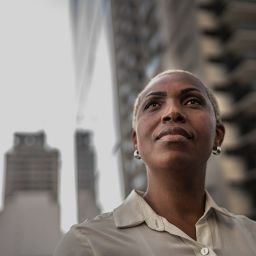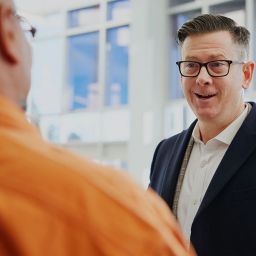Even high achieving, world-class business leaders don’t get it right every time. But they do learn from their mistakes. The question is, what exactly is that special something they take away?
In this installment of the This is Real Leadership podcast series, Elena Betés (IESE MBA), founder, CEO and entrepreneur and Professor Iñigo Gallo, Associate Professor of Marketing at IESE Business School (one of the world’s best business schools) – ranked No.1 in the world for six years running by the Financial Times reveal the mistakes that made them better business leaders.
How does a whoops become a win? Elena Betés, who launched and sold the insurance comparison platform Rastreator, was named in Forbes Top 100 Most Creative list AND won the International Women’s Entrepreneurial Challenge award says she is “a bit of a fighter”. Iñigo wants to know if this helps her bounce back, or gets her in trouble…
This is Real leadership podcast: Every episode, a business leader shares human stories and hard truths from their career. And an expert turns those stories into lessons we can all learn.
In this episode, Elena and Iñigo discuss:
- How to be an outsider (and love it).
- How to use mistakes as motivation.
- Who gets the blame?
- How to define success on your terms.
Listen to this podcast:
Listen & subscribe on:
Spotify Apple podcasts Amazon podcasts
Fore more content like this visit the Real Leadership website.
Podcast transcription:
Adam:
Hello and welcome to This is Real Leadership. Where, every episode, a brilliant business leader shares human stories and hard truths from their career. And an expert turns those words into lessons we can all learn.
I’m Adam Burns. I’ve been talking and writing about business leadership – good and bad – for over 25 years and I still have a lot to learn. Which is why, in this podcast, I’m also joined by that expert – a distinguished professor from IESE, one of the world’s best business schools – ranked number 1 in the world for six years running by the Financial Times.
They’ll also be talking with our guest. And then, just with me. Offering their expert analysis of the conversation as I ask: what are the real leadership lessons here? What can we learn, in the next 30 minutes, that can have a positive impact on us, the people around us, the places we work and society as a whole?
No buzzwords. Real people, real talk.
Welcome Professor Iñigo Gallo…
Iñigo:
Thank you, Adam. It’s very, very good to be here with you.
Adam:
So, this episode is about mistakes made and lessons learned. Iñigo, you’re IESE’s Associate Professor of Marketing. What is the biggest lesson that you’ve learned?
Iñigo:
I remember, in my first year, I was very, very scared about having other professors sit in my classroom to observe how I was doing, and then give me feedback. And it’s something that I’d try to avoid as much as I could. Now, I regret that. I should have done that more often, and earlier. Because it’s one of the best ways we have that can help us really improve. There are so many small things in the classroom that you’re not aware of. What you do with your hands, how you move, where you look, so many things. And when you have someone who has done it for a few years, and is looking at the event from outside, and who cares about you and wants you to do well, getting feedback from that person is fantastic. And I didn’t do that early enough, and I didn’t do enough of it. So, I’m happy to say that I’m doing it a bit more now, and I think it’s very useful.
Adam:
So, embrace the feedback. Right. Who is our guest? Elena Betés Novoa is a founder, CEO and entrepreneur. She launched the insurance comparison platform Rastreator in 2008, and built others for its main investors, Admiral Group and Mapfre, selling them, in 2021, for 508 million pounds sterling. That same year, Forbes named her in their Top 100 most creative. In 2022, she won the International Women’s Entrepreneurial Challenge award. Today, she’s back in the entrepreneur world, this time to have an impact in education, as CEO of dide.org, a platform that promotes inclusion in schools, identifying strengths and potential learning gaps.
We asked Elena to revisit some of the – let’s call them teachable moments – in her amazing career. But we start with the moment that many businesses don’t teach, and won’t learn. What happens when a talented woman sees your glass ceiling?
—
Elena Betés Novoa:
You know, I have to start by saying that I’m a bit of a fighter. And, as a fighter, when you are young and you see that there are gender differences, you say, “Oh, there is no glass ceiling. That was for my mom. I’m going to prove to everyone that we are all treated equally. And if I put in a lot of effort, I will. I will be at the top of the corporate world”. So, this is how I started my career; saying I’m going to be in a top company, and I’m going to become a partner. And so, I went into financial services, which was, like, 10% females. And the first thing I was surprised by is that there were no female partners. The second is that, even among the senior managers, there were only two females, and they were struggling. So, in the corporate environment, it was already obvious that they were not going to make it. And I found that, kind of, difficult. And then I realized, maybe that’s wrong. Maybe I should not try to break the ceiling from inside, but, you know, try to break the ceiling from outside. And that has been the motivation for my career; to go outside this corporate world and create another entity that has a different culture, but which keeps the same ambition of excellence. We want to be the best, we want to be number one, we want to be the winners. But with a culture that is much more balanced, and allows a balanced environment, and having a family, or whatever you want to do with your free time. So, for me, this ceiling was like a motivation instead of an issue, you know? I tried to find a way.
Iñigo:
But to break something from outside is a humongous task. Did you predict how “successful” you were going to be?
Elena Betés Novoa:
I clearly had that vision, but I never thought that it was going to be so difficult. Because when I started, of course, you don’t have this cultural base. You have your commitment, but then you start hiring people. And, of course, if they finish at five, they finish at five. It’s a tiny entity. So, quite often, it’s difficult to transfer this kind of energy, of saying, “We are going to lead”. You really have to visualize it, and convince everyone who works with you that this is feasible. That we’re going to be able to do it. But, when I started, it was in a tiny project with funding from family and friends. And I realized that I was starting to lose my vision, because daily operations were so hard. I realized I could not be excellent. I didn’t have the resources. I didn’t have the infrastructure. I could not scale it. And I started searching for funding. I think that’s quite a relevant and important moment, when you move from family and friends funding to more professional funding. Because it is an input of trust for you. If you don’t take that step, you always doubt it. It’s like, “Oh, it’s because they love me. They care about me. And that’s why they are betting on me.” Versus, “It’s because they really believe that I’m capable of delivering my vision”. And I failed. I failed at raising capital. And while I was raising capital, I joined a different project, and I went to Germany, and failed again.
Iñigo:
How do you translate, or how do you make use of that experience of yours, of having failed a number of times? You mentioned at least two of them, but I’m sure there were more. And how do you to transmit this culture to the team of, I don’t know what to call it, but, this culture that is open to, “Listen, making mistakes is okay. We’re in a learning environment.” But, at the same time, even though you have this culture that is open to mistakes, you still have to meet certain deadlines and you have to achieve certain goals.
Elena Betés Novoa:
There were different things that helped. One is that part of the team was made up of people that had failed with me. So, after we went bankrupt together, we stayed together. And when I was given capital again, I said, “We are going to hire my team.” So, this team has gone through a process of liquidating a company with me. And, I always say, when you close a business, you see the best and the worst of people. I always say that, even when you’re failing, you have to fail right. Okay? And failing right means caring about employees, caring about clients, caring about what you are doing. So, the first thing is, I had people on my team from day one in rastreator.com that had come through a process with me. And when you go through that process, you realize something that is quite relevant, which is that, entities are entities, what matters is people. And everybody says it, but when you have gone through that process, and you have moved from one entity to a different entity with the people embedded, then it’s in our DNA. When you go through that process, you really start prioritizing much better. So, you know exactly what is relevant, or important, and irrelevant. And that’s a process which is really important when you are setting up a company.
—
Adam:
So, failures can provide motivation and illumination. It was corporate failure, the glass ceiling and a poor work-life balance, that crystallized Elena’s vision of what a company could provide. And it was her own failures in funding that taught her what a team can be. If, as she said, you fail right.
The next part of our conversation is about real talk. Specifically, Iñigo wanted to know how Elena deals with mistakes at the point of origin, the moment something goes wrong…
—
Elena Betés Novoa:
If something goes wrong, you know, and everybody’s there, you say, “No problem. Great. This is an opportunity.” If you are in a one-to-one with somebody, and something has gone wrong, you go deeper and say, “Okay, what could you have done better? And what could I have done better to make sure that this doesn’t happen?” But if you are communicating to your board, then the mistake is yours. And you have to put it out there. I’m really tough on the boards. I go to them and say, you should fire me because of that. So, I’m not minimizing the mistakes. And if I am going to be reporting to a board, I will frame the mistakes, and shape it. I will give them the relevance that they have, and I will own them. So, I will say to my board, “You know, that was my fault. Those were the reasons. This is the post-mortem analysis. This is what we have learned.” And that’s something that hasn’t come to me naturally. Culturally, as Spanish people, we are optimistic, and we always move forward, and we sell. You know, we go there and say, “This is everything that has gone well.” And I learned from the UK, and British culture, you always have to give the pros and cons, and you can be better, and be tougher with yourself. That has been like another new process. So yes, communication is fundamental.
Adam:
Do you think it is really important to reframe failures as opportunities to learn? Or do you think it is important to acknowledge they are a failure, and then flip it into an opportunity to learn?
Elena Betés Novoa:
I think we have to acknowledge it as a failure, as a mistake. This was wrong. But we have to flip almost immediately to the opportunity. So, I think, it’s not about being soft. It’s not about saying we haven’t failed. I’m really tough on saying, this was wrong. And I’m really tough in a one-to-one communication. Those are the hundred things that we have to improve. But at the same time, I always finish with, “Okay, those are opportunities. So, how are we going to get better?” That’s the key aspect. Because if you fail, you have made a mistake for a reason. You may be missing some capabilities, or you may have some fears about doing things in a different way. So, you have to go deeper in order to find out that there may not be a process in place to solve that. You may not have sufficient resources.
Iñigo:
Elena, one thing I was thinking about as you were talking; there’s two things about mistakes, I think, that we, maybe most of us, at least I, definitely think about. Sometimes I resist the temptation, other times I don’t. But, two consequences. One would be, identifying who’s to blame, to put it in very simple terms. And second, are there consequences for this person or for this team? And so, again, I’m just curious about your thoughts on this. Is this a good way? Because sometimes you can think that this is useful. It’s part of the learning experience. And if there are no consequences, then maybe we don’t learn. But you can also find arguments for the other point, which is, “Listen, let’s really favor this culture of learning. Let’s not have people being defensive. And so, let’s treat this in a different way.” What’s your take, and what experiences have you had in the past that speak to this?
Elena Betés Novoa:
Having responsibility over failures and mistakes is fundamental. But, it’s not blaming. I think the problem is, when we move into blaming, it has a negative connotation. This was your responsibility. And, for whatever reason, it hasn’t worked right. Fine. You know, let’s explore why this has happened. Let’s explore if there was a mistake on your side, personally. And it’s all about resources. You can do everything right if you have the resources, and you have the time to devote to it. If you were not devoting the time and the resources to that thing, it’s because I allocated this responsibility to you wrongly, because maybe I’m giving you some… It’s about exploring why this happened, instead of who is to blame.
Adam:
But on a fundamentally human level, how do you avoid being cross with the person? Being frustrated with the person? Because at some point, a failure is a mistake. Probably, not in all cases, because in some cases it is systematic, but in some cases, it is a mistake that somebody has made. Is there a process you go through whereby, if a mistake has been made, there is a pragmatic process we follow? We don’t talk about it immediately. We always make sure there is 24 hours distance. That sort of thing…
Elena Betés Novoa:
When we find that something that is wrong, we tend to approach it in a really urgent way, because at that moment, we don’t know exactly how big the mistake is. You know, it’s like, something is happening. So, we don’t wait. And, at that moment, you try to control emotions, and it’s about finding out facts and understanding what the impact is. What we do is that after, like, a week, then we do a post-mortem analysis. Like, something has gone wrong. Then, we do a deeper analysis. And this deeper analysis will include more, like, that was your responsibility. How do you manage to… But if somebody makes a mistake hundreds of times, and it’s the same mistake, sorry, you don’t manage it. You have to fire that person. Either you take that person and put them in a different position because that wasn’t the right one – and this is your responsibility – or, if you hired this person for that responsibility, you really made a mistake in selection. And then you have to take further actions, okay? But, in general, with immediate mistakes, or issues that are having a negative impact on the company, it’s immediate action. And then a week later, post-mortem analysis with KPIs and metrics. And then, you know, if this repeats… Because, the key factor with mistakes is learning from them. If you don’t learn… We always say we don’t hire and we don’t fire anybody for making mistakes. We fire people for not learning from the mistakes they made.
—
Adam:
So, how you deal with a mistake may be situation dependent – do you have an audience or are you one-on-one? But the overall response is not. And it should be familiar to everyone who enjoys a medical drama: triage to determine urgency and nature of response. Then, one week later, and with much cooler heads, post-mortem analysis.
But is this ever-so modern cult of the mistake as a teachable moment really necessary? Before I speak with Iñigo about his lessons from Elena, here they are, asking and answering that very question, and talking about the power of being different…
—
Iñigo:
Elena, let me be a little, counter…whatever… If you could envision a version of your history where you are equally successful, without having made those previous mistakes, would that be a better place? Do we sometimes put too much emphasis on the benefits of making mistakes? And would it be better to succeed without having made those mistakes?
Elena Betés Novoa:
I don’t think I would have succeeded without mistakes. You know, with the first entity, I made a mistake about technology. I didn’t know enough. The point is that, mistakes point you in the direction your career should go. I learned much more about technology in the next stage of my professional career. With the second entity, I made a mistake by not knowing enough about media, and I underestimated it, or overestimated the cost of acquiring business. So, the point is that I would not be who I am without my failures. I always explain that, you know, I am dyslexic. I would not be here if I weren’t dyslexic, because it makes me so resilient that I was able to take a business model and try three times. So, probably, if I weren’t dyslexic, I would not have done that. The point is that, we are the results of our mistakes or failures. And maybe mistakes or failures have a negative connotation – not for me. For me, being dyslexic made me different, it made me unique, it made me who I am today. So, it’s almost like a present. In that moment, you don’t see it as a present, but it gets you to where you are. So, I would not be successful, or be who I am, without these processes. I try to surround myself with people who are moving; moving to improve. And by moving to improve, I am pushing them out of their comfort zone. They make mistakes, we handle them, we move, we learn. And I do it everywhere. I do it, like, even personally. I was joking, because this weekend I went kickboxing. I am terrible at kickboxing because, as a dyslexic person, when they say right, I punch left, when they say left… And I think all my class may be thinking, “This crazy Spanish woman is terrible. She looks like she’s stupid”. The point here is, I know I’m not stupid, but I’m putting myself in a place that everybody else thinks I’m stupid. That’s good, you know, because it makes me better. When I do a combo and I do it right, it’s like, success for me. And this moves us on to a definition of success. Success is not for everybody else. It’s your success. You know, what is success for you? And the moment you define success as being from your perspective, everything changes. Success for me was not, I created a company that is successful, and that’s why we are doing all these interviews. My success was that I built a culture that allowed me to be a mom, and to be number one in the market, and to create a new category. For me, that was the success, not the revenue line, not the profitability. So, I think it’s important to define your success, and define what is out of your comfort zone, and do this in every area of your life.
Iñigo:
Yeah,
Adam:
You must be a nightmare to fight against, Elena, because your opponent hears right, and I imagine they set up their left guard, and then you jab them with the left, and I imagine they’re totally unprepared for it.
Iñigo:
It’s a competitive advantage.
Elena Betés Novoa:
I wouldn’t say it’s a competitive advantage, because he’s my trainer. But, it’s an example of… You know, I try to push myself into environments where I’m making mistakes all the time. Because I think, another thing that happens throughout our careers, is that we are scared. And especially if you have successes, then you are scared to fail again, or you are scared to make mistakes again, because everybody’s expecting something from you. Like, you’re a leader, and everybody’s expecting you to be right. No, I’m wrong. I’m wrong a lot of times. I make mistakes every day. And if I didn’t, I wouldn’t be evolving, you know? But, this gives me the freedom to try new things. So, this is the philosophy that I try to apply. And, when you set up a culture, it works everywhere. Because you hire people that may not have experience, you let them make mistakes, you let them learn, you push them out of their comfort zone. And this tends to be fun. So, the people that work with me tend to be happy. Whether…
Iñigo:
Yeah,
Elena Betés Novoa:
you
Iñigo:
Thank you. This reminds me of something that I think many of us mentioned, or discussed, with the MBA students. I know you’re an MBA yourself, from our school. 2004, I believe, is when you graduated… So, we were talking, here, about failures and mistakes and really the definition of failure. That’s tricky, because, how do you define failure? What is failure for you? And that brings us to, of course, how do you define success? Which is, in theory, the other end. And I think what you’re saying resonates a lot with some of the things that we mention in class, such as, success is not outside. It’s not a KPI. It’s not a promotion. It’s not how big your office is. It’s not whether you were able to get this company car, or buy this house, in the end. It’s something that is a little deeper. It’s inside, and it’s whether you’ve been able to tell yourself, “Hey, I’m at peace, because I put in the effort to be the best I can be”. And that is way deeper than a KPI, whether you hit a number or a revenue goal or profitability or not. And so, I think this speaks to your experience as well.
Elena Betés Novoa:
Absolutely. And I think success is getting your company car and your next status. That’s success too, if you define it as such. And it’s great, because that means, in that organization, that you are evolving. So, I’m not against it, but we learn, with Nuria Chinchilla, about the different motivations. You have to have a base, like your salary. You have to have the learning, and you have to have the impact of all the other things. Each of us has a different balance of all these things. And it’s important for us, as managers, and as leaders, to really understand what success is for that person, and help them to achieve it. So, yeah, I think success definition is really individual. And, as a leader, you have to push people to think about it and help them to make their dreams a reality.
Iñigo:
That’s very good to hear.
Adam:
Elena, thank you very much indeed.
Elena Betés Novoa:
You’re welcome.
—
Adam:
So, Iñigo, time for your analysis. I am looking forward to this. We promised real people, real talk and real business lessons you can use. What did you learn? What do you take away from Elena?
Iñigo:
I think we’ve been lucky to listen to someone that has, in a way, worked her way through a number of failures, as she uses the term. And that she has come out the other end. And at least, again, from a business perspective, there’s no question that she has been and is being successful. But I think, what we gather from the conversation is that, beyond that, she understands, or she sounds like she believes, that these successes were bigger than just the economic success. And that for her, and the people around her, and the people that she was leading and working with, this was a bigger, deeper thing that went beyond just the economic success.
Adam:
Is leadership that ability to constantly go back to the vision? To constantly sell people on the vision and to make people think bigger, themselves, in their own role, and buy into what that organization is trying to do?
Iñigo:
Well, I think this is definitely a characteristic of a leader. There’s no question that I think someone can have a very clear mind about what he or she wants, as long as that thing that they want is good and big. She had a vision; a clear idea. And I think she, I don’t know what the word would be, pushed, or pulled, people forward. So, she inspired from within. I don’t know what the best way to put it is, but it sounds like she, in a way, puts into practice something I think we insist on a lot at IESE, which is that businesses are obviously very complex organizations, but at the essence, at the core, they are communities of individuals, of human beings. And, therefore, that is what matters most in an organization. It sounds, from her experience, like she never lost sight of that, and that was always at the center of her initiatives.
Adam:
And what about mistakes themselves. I thought Elena was brilliant on mistakes. But an awful lot of businesses, still, to this day, don’t like mistakes. Don’t like to admit to mistakes. Don’t like to discuss them, to analyze them, all that sort of thing. What do you think?
Iñigo:
I think, what I gather from this conversation is, that she has a very balanced take. I think it’s a little too easy to overemphasize the positive aspects of failing, as people have done in the last few years at least, and maybe even earlier. And especially coming from people that have succeeded at some point. It’s kind of easy to go back and say, well, it’s so good to fail because you learn so much. But I don’t think she… I think her take on failure is really balanced. I think she acknowledges that, of course, it is better to avoid mistakes if you can. But, listen, they’re inevitable to some extent. And we all fail; we all make mistakes. Noone’s perfect. And so, when those mistakes happen, okay, let’s own them, let’s review them, let’s not wait more than a week, I think she mentioned. I thought that was a very small thing, a practical thing, but I liked it. Let’s treat them differently, depending on whether we are in a group versus in a one-on-one conversation. That’s another thing I liked. But, again, she has that balanced take on staying in the middle, so to speak. Not overemphasizing the “beauty” of making mistakes, but at the same time, not criminalizing them, not looking for someone to blame, and just working with it, and making all of us better.
Adam:
Fantastic. Iñigo, thank you very much indeed.
Iñigo:
Okay, thank you, my pleasure.
Adam
Thank you Professor Iñigo Gallo, Associate Professor of Marketing at IESE Business School. And thank you for listening. Please do subscribe, share and let us know what you think of our podcast. Are mistakes teachable moments to be held up for all to discuss, or private errors to be acknowledged, admonished, and moved on from as quickly as possible? Do you think differently to Elena and Iñigo? And who would you like us to talk with in future episodes, or about what? Please do send us an email, let us know your thoughts. All details are in the podcast description. But, for now, goodbye.
Real people, real talk and real business lessons you can use. This Is Real Leadership.

















